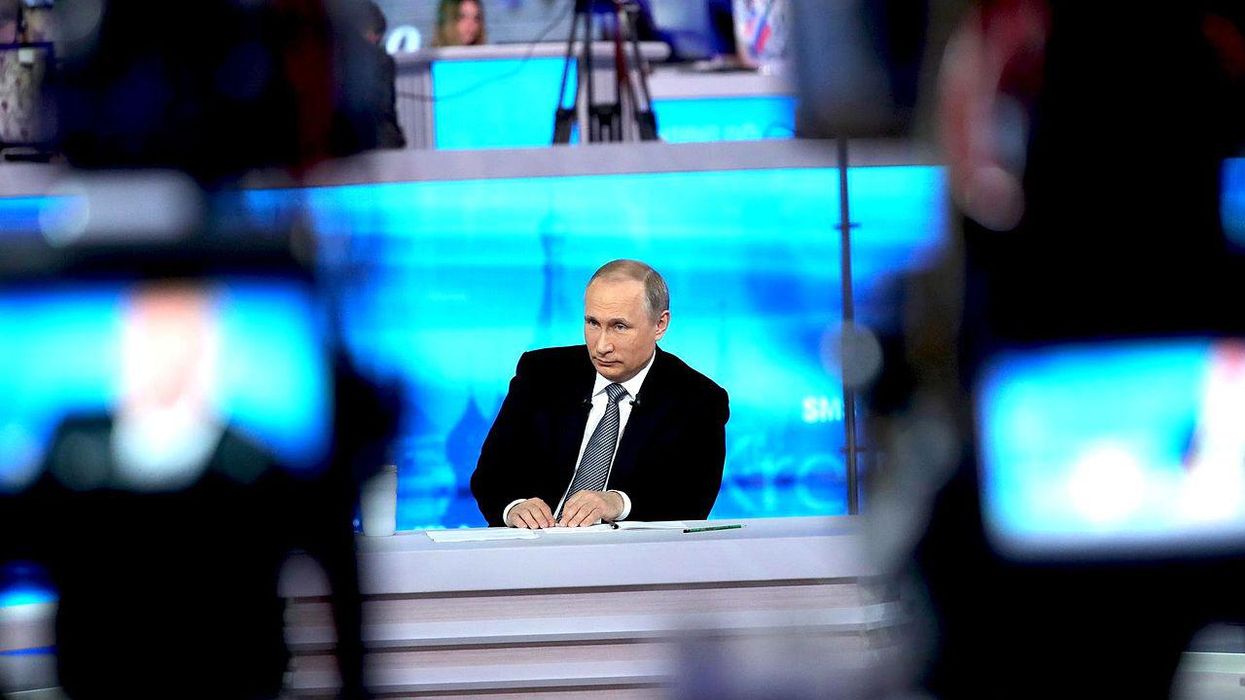How Kremlin media disinformation on Ukraine indoctrinates viewers well beyond Russia's borders: report

Russian President Vladimir Putin on Russian TV in 2016, Wikimedia Commons
April 15, 2022 | 08:15AM ETWorld
Since launching the invasion of Ukraine on February 24, the Russian government, under President Vladimir Putin, has forcefully cracked down on opposition media within Russia — and criticizing the invasion has become a criminal offense. State-operated Russian media offers a steady diet of disinformation, lies and pro-Putin propaganda, claiming that the war was totally justified.
Journalists Simon Ostrovsky and Emily Rhyne, in a report for the New York Times posted on April 15, take a look at the type of disinformation coming from Russian state media — disinformation that, they emphasize, is showing up outside of Russia.
The Times, for the video, visited Transnistria, an unrecognized Russian “breakaway state” in Moldava. Internationally, Transnistria is recognized as part of Moldava, which is one of the seven countries that has a border with Ukraine. But in Transnistria, Kremlin lies about Ukraine aren’t hard to find.
One of the false claims that is repeatedly heard in Russian media, the Times notes, is that the invasion of Ukraine was necessary in order to rid the country of Nazis.
“The false claim about denazifying the country is frequently cited in Russian news media,” the Times observes. “And inside Russia, even calling what’s happening in Ukraine a war could land you in prison. But how powerful is Russia’s disinformation campaign, and how does it spread beyond its borders?”
In Transnistria, the Times interviewed some residents who have bought into Russian disinformation. One of them repeated the Kremlin claim that biological weapons were being developed in Ukraine. Showing a clip from Russian media making that claim, the Times noted, “False reports like this one are readily accepted here.”
The Times notes, “Another false claim spread by Russia is that Ukraine is now run by ultra-nationalists who want to eradicate Russian speakers…. In reality, it ignores the fact that Ukraine’s president, Volodymyr Zelensky, is himself a Russian speaker whose ancestry is Jewish.”
To be sure, Zelensky’s native language is Russian, although he is also fluent in Ukrainian and speaks English as well.
Yulia Baltag, a Transnistria resident interviewed by the Times, made it clear that she believes Russian media rather than Ukrainian media. Speaking in English, Baltag — who would like to see Transnistria formally become a part of Russia — told the Times, “I would not trust the news that they show on Ukraine TV…. The way Ukraine defends themselves is in a bad way, I would say. There are also rumors that they use some biological weapons…. Russia didn’t go anything aggressive, and right now, I think they just need to protect their land.”